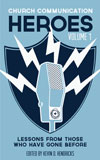“It flows from the highest mountain, it reaches to the deepest valleys, His love that gives me strength from day-to-day will never lose its power.” -Andraé Crouch (1942-2015)
I briefly shared about Andraé Crouch during our church services on the Sunday after he died, though I’ll admit that I wasn’t entirely sure why at the time. I’m fairly certain that Christians more famous than Crouch die on a regular basis and rarely get so much as a tip of the hat at our church. Still, I felt compelled to acknowledge his passing for two reasons.
He’s in the Hymnal!
First, Crouch was one of the few composers still alive whose work was featured in the hymnal we use at one of our services. I would have done the same for Sir Isaac Watts or Fanny Crosby, but alas, their times have long since come and gone.
Recent Church History
Second, I felt like Andraé Crouch was a name our young people needed to know. Most church history can feel like it happened so long ago, but Crouch was a living legend. Kirk Franklin confirmed as much when he referred to Crouch as “the architect of gospel music” in a tweet that broke the news of Crouch’s death to me.
Just got a call..the architect of gospel music, Andre Crouch…has passed.
— Kirk Franklin (@kirkfranklin) January 9, 2015
Those reasons may merit a mention of Crouch in a church service, but why lift him to the status of church communication hero?
Andraé Crouch Was Real
We see the seemingly saccharine happiness of the 1970s Jesus People music or the 1990s Christian metal that looked and sounded like the 1980s and we groan. But Crouch and friends were the embodiment of that magical four-letter word toward which we Christians strive today in order to reach those skeptical Millennials: real.
Crouch’s music sounded like real music of the time (and some of it was simply better). It wasn’t filed under “CCM (Contemporary Christian Music)” or “Praise & Worship.” It was just music. There was a memorable moment during my recent binge-listening of Crouch when I heard a familiar musical element and blurted out, “That’s something Marvin Gaye would do!” That’s in stark contrast to many of today’s Christian artists, whose music often sounds unmistakably like it belongs in its own well-defined genre.
Connecting With People
Crouch also engaged with real people, not just those within a Christian circle. Try to imagine the following headline for the obituary of a notable CCM artist like Chris Tomlin, David Crowder or even Michael W. Smith: “One of the greatest gospel singers of his generation, known for his choral work with Michael Jackson and Madonna.” I can’t do it. Yet, that was what The Guardian used for Crouch.
CCM as an industry seems content to remain isolated from interacting with their musical peers in secular culture. Too many Christians have eagerly followed suit. We’re hesitant to engage with others outside our church culture because it’s comfortable to stay where we are. There’s risk involved in spending time with people who think and live differently than we do. Befriending a rock star probably carries with it more temptation than we could possibly imagine.
Crouch mastered the art of being in the world, but not of it. (This is not to say that he was without blemish: Crouch was arrested for cocaine possession in 1982, though the charges were ultimately dropped.) In an era when culture wants us to fit neatly into boxes marked conservative or liberal, Christian or secular, Crouch seemed as comfortable sharing the stage with Billy Graham as he did sharing the studio with Elton John.
Crouch exemplified being salt and light as described by Jesus in Matthew 5:13-16. He was the same guy who loved Jesus and sought to bring God glory, regardless of circumstance. Crouch continued to sing songs about the King of Kings even while he wrote arrangements for The Lion King. When I think about the purpose of letting our light shine before others, I think of all the good works to which Crouch contributed, sacred and secular, and I can’t help but give glory to my Father in heaven for the things Crouch has done.
Connecting By Creating
If there’s anything for Christians—and ultimately church communicators—to learn from Andraé Crouch, maybe it’s that people outside the church are a lot more willing to engage with us than we think, especially through creativity. God chose us to emulate his creative nature to build things of much greater grandeur than the wall we erected between sacred and secular. For Crouch, there was no wall. He reached people from all walks of life by creating music with them.
The legacy of Andraé Crouch has little to do with his Grammys, Oscar nomination, or laundry list of famous friends. Some have credited Crouch as the founder of CCM for his success in taking musical elements from the radio to the sanctuary, but I think his claim to fame is so much more.
Ultimately, you couldn’t know the name of Andraé Crouch without hearing the name of Jesus Christ. And a whole lot of people across all lines—race, religion, gender, orientation—got to know his name over the last 72 years.
More
 Learn more about church communication heroes with our ebook, Church Communication Heroes Volume 1: Lessons From Those Who Have Gone Before.
Learn more about church communication heroes with our ebook, Church Communication Heroes Volume 1: Lessons From Those Who Have Gone Before.- Christianity Today: Remembering Andraé Crouch, Dead at 72
- And how about some music?
“Can’t Nobody Do Me Like Jesus”:
“Soon and Very Soon”:




